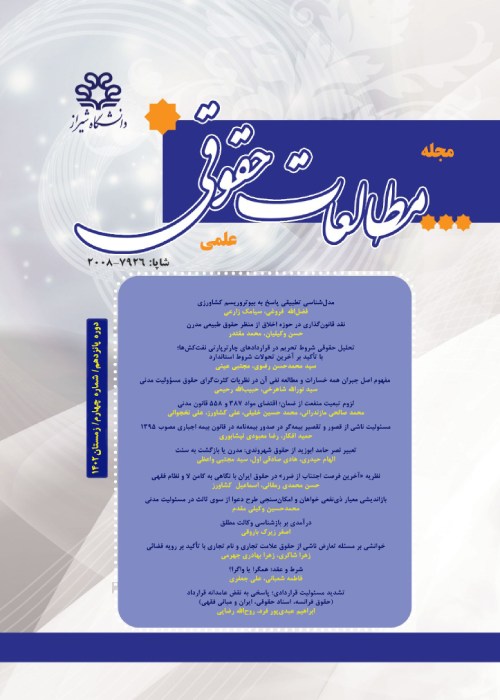Description of the Contract in Iranian Law with a Look at Foreign Law and Islamic Jurisprudence
The codification of contractual laws necessitates that a contract falls within the protective framework of either definite or indefinite contracts. It is crucial to ascertain the type of the contract based on both evident and latent aspects. A significant matter within the realm of contract law, closely linked to delineating the rights and extent of obligations of the involved parties, is contract description. This issue arises when the parties, either due to unfamiliarity with the contractual system or for various legitimate or illegitimate reasons, select an incorrect title for their contract or enter into a contract with no explicit terms. Consequently, the judge may either deem the parties' choice satisfactory or encounter uncertainties in determining the contract, potentially resulting in deviations in contractual effects. In contemporary times, novel legal relationships emerge among individuals, which necessitates a careful examination to determine the appropriate contractual classification. Consequently, it becomes imperative for the court to devote sufficient attention to the contract description to accurately ascertain and declare the extent of contractual obligations. The purpose of this research is to effectively assess the true nature of the contract by employing specific criteria and legal tools. The article seeks to address the following questions: What role does the judge play in determining the apparent title of the contract? Can the judge accurately describe the contract type without objection from either party, and in what legal contexts does contract description arise? Is the practice of contract description recognized in the legislation of other countries and Islamic jurisprudence? Furthermore, what criteria should be considered to provide a comprehensive description of the contract title? The author of the present work believes that when describing a contract, the judge should not be bound solely by the apparent title of the contract. Instead, the judge should discern the true nature of the contract during the legal proceedings and attribute its effects accordingly to the legal relationship between the contracting parties. Through the current research, which incorporates the viewpoints of Imamiyya jurists, as well as jurists from foreign and domestic jurisdictions, and employs a descriptive-analytical approach, the following conclusions have been drawn:Contract description involves uncovering the underlying essence of contracts by considering the parties' genuine intentions and prevailing customs. In the realm of contract law, the concept of contract description emerges when parties make errors in naming the contract or assign it a misleading title for various reasons. In such cases, the judge should not merely rely on the explicit language of the contract and consider themselves absolved of responsibility. It is insufficient to act solely in accordance with the apparent intentions of the parties. Instead, when dealing with such contracts, the judge must look beyond the surface-level words and uncover the true title or nature of the contract. The identification of the legal nature of contracts and its application to the legal forms of contracts is a widely accepted and justifiable practice in legal systems worldwide. Nowadays, in international legal documents, there is a prevailing trend to prioritize the true substance of the contract over its apparent form. However, this principle holds true unless the hidden contract is tainted by fraud and deception. In such cases, while the contract may be valid between the parties, it cannot be invoked against third parties. The prevention of formalization in contracts holds great importance for the judge, primarily to avoid falling into the traps of simulation and deviation from the true essence of the contract. Furthermore, determining the nature of mixed or ambiguous contracts is crucial, as it justifies the need for contract description and assists the judge in uncovering the applicable legal principles governing the contract. In cases where the parties have not specified a particular title for their contract, the judge bears a significantly more significant responsibility. Upon the occurrence of a dispute, the judge must first ascertain the type of legal relationship involved, as this forms the basis for rendering a judgment in the case. During the process of contract description, the judge possesses the authority to discern the title of the contract by employing various criteria. These criteria include considering the verbal statements of the contracting parties, giving weight to the true intentions of the parties, and taking into account the customs governing the relevant legal relationships. The language used in the contract plays a significant role in guiding the judge towards understanding the parties' actual intentions, particularly regarding the validity of the contract. However, it is important to note that the wording of the contract serves as a guiding principle for determining the type of legal relationship, rather than being the sole determinant for the inclusion or exclusion of specific contract language. Additionally, prevalent customs within the realm of contract formation, such as guarantees, can help resolve any ambiguities for the court regarding the primary effect of such contracts, aiding in determining their effects and legal implications.
- حق عضویت دریافتی صرف حمایت از نشریات عضو و نگهداری، تکمیل و توسعه مگیران میشود.
- پرداخت حق اشتراک و دانلود مقالات اجازه بازنشر آن در سایر رسانههای چاپی و دیجیتال را به کاربر نمیدهد.


